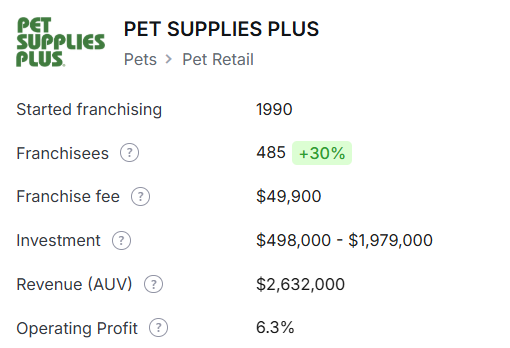
KEY FRANCHISE STATS
?
?
?
?
$0
Founded by Jim Fox in 1971 in Pitcairn, Pennsylvania, Fox's Pizza Den is a well-known pizzeria chain celebrated for its family-friendly atmosphere. The brand began franchising in 1974, just a few years after its inception, marking its swift growth in the pizza industry.
Renowned for its consistent quality and exceptional service, Fox's Pizza Den has become a fixture in the pizza restaurant sector.
Based in Murrysville, PA, Fox's Pizza Den offers more than just pizzas and sandwiches; it is a brand deeply embedded in the communities it serves, playing a significant role in local economies and uniting people through beloved food.
What sets Fox's Pizza Den apart is its simple business model, low franchise fee, and fixed monthly royalty, making it an attractive and profitable venture for franchisees. This, combined with extensive support in areas such as site selection and marketing, distinguishes Fox's Pizza Den in the competitive pizza market.
Create a free account to access this table and more.
For more information see our plans here.
Below are some of
Fox's Pizza Den
key competitors in the
Pizza
sector.

192
$500 per month
$109,000
-
$236,000
$0
n.a.
$xxx,xxx
n.a.
n.a.
The franchisor offers a thorough training program for franchisees, encompassing several crucial components:
Initial Training Program
Before launching their franchised business, all franchisees and principals must participate in and complete the franchisor's Initial Training Program. This one-week course, held at a location specified by the franchisor, is designed to equip franchisees, their management teams, and restaurant staff with the necessary skills and knowledge to operate the franchise effectively. The training covers all essential aspects of running the business, and throughout the term of the agreement, franchisees must have principals who have successfully completed this program to the franchisor's satisfaction.
Satisfactory Completion
The franchisor solely determines if the Initial Trainees have successfully completed the Initial Training Program, which includes proficiency in post-course applications. In cases where the franchisor deems that the franchisee or their principals have not satisfactorily completed the training or are unlikely to do so, the agreement may be terminated.
Additional Training
The franchisor may also provide or require additional training programs, which can be either mandatory or optional. This supplementary training is limited to five days or less per year and may come with a reasonable fee. Franchisees are responsible for all incidental costs related to attending these training sessions or the franchisor's national business meetings or annual conventions, including travel, lodging, meals, and wages.
The franchisor provides a defined territory for each franchisee, ensuring some level of protection but not full exclusivity. This means the franchisor retains the right to sell its products and services through alternative distribution channels within the franchisee's territory.
According to the franchise agreement, as long as the franchisee is not in default, the franchisor will not open another Fox’s Pizza Den outlet or grant the right to open another outlet within the defined territory. However, this protection does not apply to sales through non-traditional outlets or other channels, such as grocery stores, captive market locations, or the internet.
Additionally, the franchisor explicitly reserves the right to own, operate, or authorize others to operate Fox’s Pizza Den outlets outside of the franchisee's territory. They also reserve the right to engage in other types of businesses within the territory, including the sale of similar products or services not offered under the franchise brand, which could potentially compete with the franchisee's business.

?

?
?
?
?
?
?
?
?
?